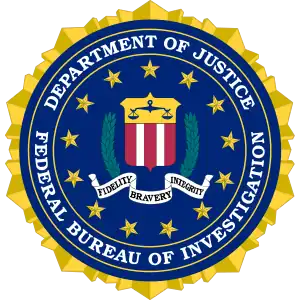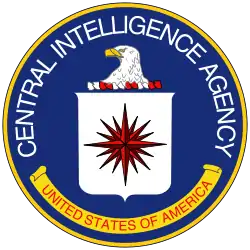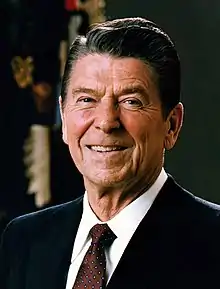William H. Webster
William Hedgcock Webster (born March 6, 1924) is an American attorney and jurist who most recently served as chair of the Homeland Security Advisory Council from 2005 until 2020.[1][2][3] He was a United States district judge of the United States District Court for the Eastern District of Missouri and a United States circuit judge of the United States Court of Appeals for the Eighth Circuit before becoming director of the Federal Bureau of Investigation (FBI) from 1978 to 1987 and director of Central Intelligence (CIA) from 1987 to 1991.[4] He is the only person to have held both positions.[5]
William H. Webster | |
|---|---|
 Webster as FBI director | |
| Chair of the Homeland Security Advisory Council | |
| In office August 10, 2005 – August 18, 2020 | |
| President | George W. Bush Barack Obama Donald Trump |
| Deputy | James R. Schlesinger Gary Hart William Bratton |
| Preceded by | Joseph J. Grano Jr. |
| Succeeded by | William Bratton |
| 14th Director of Central Intelligence | |
| In office May 26, 1987 – August 31, 1991 | |
| President | Ronald Reagan George H. W. Bush |
| Deputy | Robert Gates Richard James Kerr |
| Preceded by | William J. Casey |
| Succeeded by | Robert Gates |
| 3rd Director of the Federal Bureau of Investigation | |
| In office February 23, 1978 – May 25, 1987 | |
| President | Jimmy Carter Ronald Reagan |
| Deputy | James B. Adams |
| Preceded by | Clarence M. Kelley |
| Succeeded by | William S. Sessions |
| Judge of the United States Court of Appeals for the Eighth Circuit | |
| In office July 18, 1973 – February 22, 1978 | |
| Appointed by | Richard Nixon |
| Preceded by | Marion Charles Matthes |
| Succeeded by | Theodore McMillian |
| Judge of the United States District Court for the Eastern District of Missouri | |
| In office December 21, 1970 – July 18, 1973 | |
| Appointed by | Richard Nixon |
| Preceded by | Seat established |
| Succeeded by | John Francis Nangle |
| United States Attorney for the Eastern District of Missouri | |
| In office January 1, 1960 – January 20, 1961 | |
| President | Dwight D. Eisenhower |
| Preceded by | Harry Richards |
| Succeeded by | Jeff Lance |
| Personal details | |
| Born | William Hedgcock Webster March 6, 1924 St. Louis, Missouri, U.S. |
| Political party | Republican |
| Spouses | Drusilla Lane
(m. 1950; died 1984)Lynda Clugston (m. 1990) |
| Children | 3 |
| Education | Amherst College (BA) Washington University (JD) |
| Military service | |
| Allegiance | |
| Branch/service | |
| Years of service | 1943–46, 1950–52 |
| Rank | |
| Battles/wars | World War II Korean War |
Education and career
Early life
Webster was born in St. Louis, Missouri, and received his early education in Webster Groves, Missouri;[6] and served as a lieutenant in the United States Navy during World War II. Following his service in the Navy, he received his Bachelor of Arts degree from Amherst College, Amherst, Massachusetts, in 1947. While at Amherst, he was a member of the Psi Upsilon fraternity. He received his Juris Doctor from the Washington University School of Law in St. Louis in 1949. After law school, he served in the Navy again during the Korean War;[7] later, he joined the St. Louis law firm Armstrong Teasdale, but left private practice soon after to begin a career in public service. He was the United States Attorney for the Eastern District of Missouri from 1960 to 1961, then a member of the Missouri Board of Law Examiners from 1964 to 1969.[8]
Federal judicial service
Webster was nominated by President Richard Nixon on December 8, 1970, to the United States District Court for the Eastern District of Missouri, to a new seat created by 84 Stat. 294. He was confirmed by the United States Senate on December 17, 1970, and received his commission on December 21, 1970. His service was terminated on August 10, 1973, due to elevation to the Eighth Circuit.[8]
Webster was nominated by President Nixon on June 13, 1973, to a seat on the United States Court of Appeals for the Eighth Circuit vacated by Judge Marion Charles Matthes. He was confirmed by the Senate on July 13, 1973, and received his commission on July 18, 1973. His service was terminated on February 22, 1978, due to his resignation.[8]
Director of the Federal Bureau of Investigation (1978–1987)
In 1978, President Jimmy Carter appointed him as director of the Federal Bureau of Investigation.[9] This was despite Webster being a registered Republican.[10][11]
Webster was portrayed by actor Sean Cullen in Season 2 of the Netflix show Mindhunter, which took place during his tenure as director of the FBI.
Director of Central Intelligence (1987–1991)
In 1987, President Ronald Reagan chose him to be director of the Central Intelligence Agency. He led the CIA until his retirement from public office in 1991. Since then, Webster has practiced law at the Washington, D.C., office of Milbank, Tweed, Hadley & McCloy, where he specializes in arbitration, mediation and internal investigation.
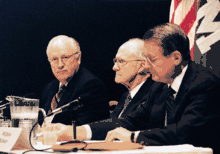
Public Company Accounting Oversight Board
In 2002, he was the first chairman of the Public Company Accounting Oversight Board (PCAOB). However, his appointment was controversial, and another controversy erupted when newspapers reported that Webster had headed the board audit committee of U.S. Technologies, a high-tech company being investigated for accounting irregularities and accused of fraud.[12] Webster resigned less than three weeks after the PCAOB was set up.[13]
Webster was the longtime chairman of the Homeland Security Advisory Council, [14] from 2005 to 2020.
In 2020, Webster, along with over 130 other former Republican national security officials, signed a statement that asserted that President Trump was unfit to serve another term, and "To that end, we are firmly convinced that it is in the best interest of our nation that Vice President Joe Biden be elected as the next President of the United States, and we will vote for him."[15]
Honors and awards
Webster received numerous honors and awards for his service. Washington University granted him the Alumni Citation for contributions to the field of law in 1972 and in 1981 he received the William Greenleaf Eliot Award. In 1984, he received the U.S. Senator John Heinz Award for Greatest Public Service by an Elected or Appointed Official, an award given out annually by Jefferson Awards.[16] In 1999 the School of Law created the Webster Society, an outstanding scholars program. Furthermore, he received the Distinguished Alumnus Award from the university's law school in 1977. The St. Louis Globe-Democrat named him "Man of the Year". In 1978, he received the Golden Plate Award of the American Academy of Achievement.[17][18]
Webster also received honorary degrees from several colleges and universities. In 1991, he was presented the Distinguished Intelligence Medal, the Presidential Medal of Freedom, and the National Security Medal. In June 2008 Webster received an honorary Doctor of Laws degree as well as honorary doctorates from The Institute of World Politics and National Intelligence University.[19] He received the William J. Donovan Award from The OSS Society in 2005 and serves as an honorary chairman of this organization.
Webster is a member of the American Bar Association, the Council of the American Law Institute, the Order of the Coif, The Missouri Bar, the Bar Association of Metropolitan St. Louis and the Psi Upsilon fraternity. Additionally, he served as chairman of the Corporation, Banking and Business Law Section of the American Bar Association. He is a fellow of the American Bar Foundation and an Honorary Fellow of the American College of Trial Lawyers. He served as co-chairman of the Homeland Security Advisory Council. In 2009, he was named to head an independent investigation of the FBI's actions surrounding the Fort Hood shooting.[20]
Webster also serves as an honorary director on the board of directors at the Atlantic Council.[21]
Personal life
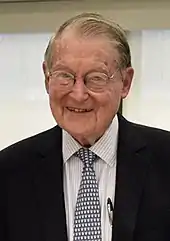
He was married for 34 years to Drusilla Lane until her death in 1984 and the couple had three children: Drusilla L. Busch, William H. Webster Jr. and Katherine H. Roessle.[22]
In 1990, he married Lynda Clugston.[23] They reside in Washington, D.C. In 2015, William and Lynda Webster were targeted by a man who peddled a lottery scam over phone calls and emails. Over multiple phone calls, Keniel Aeon Thomas of Jamaica told the Websters he'd set their house ablaze or have a sniper shoot them in the back of the head if they didn't pay him thousands of dollars, according to prosecutors' filings. The Websters used their friendship with people at the FBI to help send the scammer to prison for nearly six years in early 2019.[24]
Quotes
On March 3, 2002, the University of California, Santa Barbara, held a debate titled "National Security vs. Personal Liberty". The guest speakers were Webster and American Civil Liberties Union President Nadine Strossen. During the debate, Webster made the following statement,[25][26] which has since gained some popularity: "Security is always seen as too much until the day it is not enough." He also stated: "Order protects liberty and liberty protects order."
References
- "Acting Secretary Chad Wolf Announces New Homeland Security Advisory Council Members". August 18, 2020.
- "Webster Scholars". law.wustl.edu. August 25, 2018.
- "Homeland Security Advisory Council Members". January 14, 2014.
- "Chapter Ten — Central Intelligence Agency". cia.gov. Archived from the original on June 13, 2007.
- Katelyn Polantz (February 9, 2019). "Ex-CIA and FBI director threatened by scammer, then helps put him in prison". CNN.
- "Interview of Judge William H. Webster " Archived March 4, 2016, at the Wayback Machine, March 2006, Society of Former Special Agents of the FBI, Inc
- Charlton, Linda (January 20, 1978). "A Cautious F.B.I. Nominee". The New York Times. ISSN 0362-4331. Retrieved December 16, 2019.
- William Hedgcock Webster at the Biographical Directory of Federal Judges, a public domain publication of the Federal Judicial Center.
- "Interview with William H. Webster" Archived March 4, 2016, at the Wayback Machine, 2005, The Miller Center
- Babcock, Charles R. (January 19, 1978). "Carter Chooses St. Louis Judge As FBI Director" – via washingtonpost.com.
- Shenon, Philip (March 15, 1987). "Wanted by F.B.I. -- A New Director". The New York Times.
- Labaton, Stephen (November 6, 2002). "S.E.C.'s Embattled Chief Resigns In Wake of Latest Political Storm". The New York Times.
- Stout, David (November 12, 2002). "Webster Ends His Brief Stint on S.E.C. Oversight Board". The New York Times.
- "Ex-CIA and FBI director threatened by scammer, then helps put him in prison | CNN Politics". February 8, 2019.
- "Former Republican National Security Officials for Biden". Defending Democracy Together. August 20, 2020. Retrieved August 26, 2021.
- "National - Jefferson Awards Foundation". Archived from the original on November 24, 2010. Retrieved August 5, 2013.
- "Golden Plate Awardees of the American Academy of Achievement". www.achievement.org. American Academy of Achievement.
- "They love Cauthen, 'No great student' is among greats honored at Golden Plate awards" (PDF). The Kentucky Press.
- "Iconic Leader Honored for a Lifetime of Service, Along with NIU's Class of 2015 Graduates. Judge William Webster Receives Honorary Degree in Intelligence – National Intelligence University". ni-u.edu. Archived from the original on September 15, 2015. Retrieved September 4, 2015.
- "Former FBI chief picked to lead review". Cnn.com. December 8, 2009. Retrieved July 20, 2012.
- "Board of Directors". Atlantic Council. Retrieved February 12, 2020.
- "William H. Webster Bio" (PDF). CIA.gov. Archived from the original (PDF) on January 23, 2017.
- Clemons, Steve (June 22, 2015). "Getting to Know Former CIA and FBI Director William Webster". Capitol File. Archived from the original on February 12, 2019. Retrieved December 16, 2019.
- Katelyn Polantz (February 9, 2019). "Ex-CIA and FBI director threatened by scammer, then helps put him in prison". CNN.
- Admin (January 1, 2002). "Winter 2002". Interdisciplinary Humanities Center UCSB. Retrieved March 13, 2023.
- Strossen, Nadine (January 2003). "Maintaining Human Rights in a Time of Terrorism: A Case Study in the Value of Legal Scholarship in Shaping Law and Public Policythe Value of Legal Scholarship in Shaping Law and Public Policy". New York Law School Law Review. 46 (3): 373–394.
External links
- William Hedgcock Webster at the Biographical Directory of Federal Judges, a public domain publication of the Federal Judicial Center.
- Chairman, Homeland Security Advisory Council
- 'Speakers Debate How to Mix Freedom, Safety', The Daily Nexus; UC, Santa Barbara; Published March 4, 2002
- "Federal Bureau of Investigation: Directors, Then and Now". Archived from the original on April 9, 2010. Retrieved April 26, 2010.
- Institute of World Politics
- Appearances on C-SPAN
